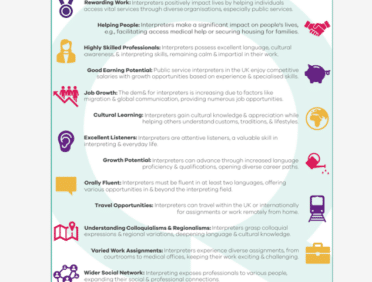Language Interpreters: Bridging Communication Gaps
Language is the foundation of human contact, allowing us to communicate across geographical and cultural borders. However, in our diversified and globalised world, linguistic obstacles frequently impede successful communication. Language interpreters emerge as indispensable linguistic bridgebuilders, enhancing understanding and collaboration among speakers of different languages.
In the United Kingdom, where many languages coexist, a thorough grasp of the various types of language interpreters is critical to maintaining the accuracy and effectiveness of communication across linguistic divides.
Language Interpreters
Language interpreters play an important role in our linked and linguistically diverse world. Interpreters are critical in breaking down language barriers and promoting mutual understanding, whether they are aiding international diplomacy, ensuring justice in the courts, or assisting people in accessing healthcare. In the United Kingdom, where language variety is a distinguishing feature, the demand for experienced interpreters is growing.
The demand for interpreters continues to rise in the United Kingdom, where language diversity is celebrated. As the country welcomes people from all over the world, the demand for experienced language interpreters grows even stronger. Furthermore, interpreters contribute to the country’s commitment to diversity and inclusivity by ensuring that language obstacles do not prevent access to important services, education, healthcare, and job opportunities.
The Role of a Language Interpreter
The importance of language interpreters in the United Kingdom, and indeed throughout the world, cannot be understated. They are the links that allow individuals, communities, and nations to interact, collaborate, and prosper in the face of language diversity. Interpreters are the unsung heroes of communication, whether they are breaking down language barriers in diplomacy, ensuring justice in court procedures, or facilitating healthcare access.
Their commitment to precision, cultural awareness, and effective communication contributes to a more open and linked world. As the global community evolves, the role of experienced language interpreters in encouraging mutual understanding and collaboration is more important than ever.
Simultaneous Interpreters: Navigating Real-Time Communication
Simultaneous interpreters are probably the first kind of language interpreter that people think of. You may have seen them at international conferences, diplomatic summits, or even on worldwide news broadcasts. Their extraordinary capacity is to deliver instant translations as the speaker speaks while retaining a consistent and fluid interpretation. This type of interpretation necessitates a high level of verbal proficiency, focus, and mental agility.
Simultaneous interpreters often work in soundproof cubicles with specialised equipment such as headsets and microphones. They use headphones to listen to the speaker, simultaneously speak into a microphone, and broadcast their interpretation to listeners in real time. This method reduces disruption to the natural flow of the dialogue, ensuring that multilingual meetings go smoothly.
Consecutive Interpreters: Deliberate and Detailed Communication
Consecutive interpreting is the most common form of interpreting and consecutive interpreters are frequently employed in situations such as public services like hospitals, job centres or government offices. Rather than interpreting while the speaker is talking, consecutive interpreters attentively listen to them, taking notes to capture the substance of their speech. When the speaker finishes, the interpreter provides an interpreted version of what was stated.
This strategy provides for more extensive and reflective communication because interpreters can digest the topic and appropriately express it. It is especially useful when dealing with difficult or delicate themes where precision is required. However, as compared to the real-time efficiency of simultaneous interpretation, successive interpretation takes more time.
Whispered Interpreting: A Subtle Art of Communication
Whisper interpreters, also known as chuchotage interpreters, work in a similar way to simultaneous interpreters in that they provide their interpretation while the speaker is talking. They forego the soundproof room and equipment, instead situating themselves near the people who require interpretation. They deliver a whispered translation of the ongoing discourse in quiet tones.
This method of interpreting is most commonly found in courts, where there isn’t the time for consecutive interpreting. Because they operate in difficult and high pressure circumstances, whisper interpreters must have extraordinary linguistic abilities as well as the ability to maintain great focus. This strategy is especially useful in intimate or informal settings where it is critical to retain the natural rhythm, and accuracy, of what is being said.
Escort Interpreters: Navigating the Crossroads of Culture and Communication
Escort interpreters have a unique function, following individuals or small groups in a variety of settings, such as medical appointments, business excursions, and social engagements. Their major job is to facilitate on-the-spot interpretation, bridging language gaps between non-English speakers and service providers or hosts.
This form of interpretation involves more than just linguistic ability; it necessitates a deep awareness of cultural nuances, social etiquette, and situational context. Escort interpreters not only interpret words but also serve as cultural bridge builders, assisting clients in navigating foreign surroundings and interactions. They are crucial in ensuring that people have access to necessary services and may fully participate in social and professional activities.
Sign Language Interpreters: Fostering Communication for the Deaf Community
Sign Language Interpreters play an important role in facilitating communication for those who are deaf or hard of hearing. They bridge the gap between sign language and spoken language, such as British Sign Language (BSL) in the United Kingdom. As a result, deaf people can access information and engage in conversations with people who do not use sign language.
In a range of circumstances, from educational settings to medical appointments and court procedures, the deaf community heavily relies on relay interpreters. These interpreters must be fluent in both sign language and spoken language in order to transmit the desired message effectively while respecting the linguistic and cultural peculiarities of both cultures.
Telephonic and Video Interpreters: The Digital Age of Interpreting
Technological advancements have ushered in a new era of interpreting, with telephone interpreters and video interpreters becoming more common. These interpreters work remotely, engaging with clients via the telephone or video conferencing software. This style of interpreting provides individuals and organisations with rapid access to interpreters in multiple locations, making it extremely convenient.
Telephone and video interpreters are critical in breaking down geographic obstacles. They’re especially beneficial in situations where in-person interpreting isn’t possible, such as medical consultations with non-English-speaking patients or courtrooms. These interpreters must be technologically knowledgeable and adaptive to a variety of digital platforms in order to provide a smooth communication experience.
Legal and Medical Interpreters: Precision in Specialised Fields
Legal and medical interpreters specialise in their fields, collaborating with specialists in the legal and healthcare fields. In these high-stakes situations, precision and clarity are critical. Legal interpreters work in courtrooms to ensure that non-English speakers properly understand legal procedures and have a role in their legal concerns. Medical interpreters, on the other hand, help healthcare providers and patients communicate more effectively, allowing for more accurate diagnosis and treatment.
Interpreters in these disciplines must be well-versed in legal and medical terminology, as well as be able to deliver complicated material effectively. Misinterpretation or misunderstanding can have serious implications, making their work critical to ensuring fair and effective communication.
Community Interpreters: Bridging Gaps within Communities
Community interpreters are critical for promoting inclusion and integration in heterogeneous cultures. They are employed in a variety of settings, including schools, social services, local government, medical centres, job centres and non-profit organisations. Their purpose is to assist non-English-speaking individuals in gaining access to critical services and information, ensuring that language obstacles do not prevent them from participating in society or accessing vital services.
Community interpreters play an important role in bridging communities in the United Kingdom, where many languages and cultures coexist. They promote language diversity and cultural understanding, fostering social cohesiveness and mutual respect. These interpreters must be sensitive to the unique demands and challenges of the communities they serve.
Machine Interpreters: The Role of Technology in Language Translation
When speaking of machines, people often get confused due to the rise of automatic translation tools such as Google Translate. These software solutions provide a basic understanding of text or speech in a variety of languages. Despite significant advances in computer interpretation, it is still unable to match the depth, context, and cultural sensitivity that human interpreters readily deliver.
Machine translation can be beneficial for quick translations of simple material or when access to a human translator is not immediately available. Their limits become clear in increasingly complex settings, where accuracy and cultural nuances are critical. They are a useful tool for basic communication, but they cannot replace a human translators’ knowledge and adaptability.
Key Takeaways: The Different Types of Language Interpreters
- Language interpreters play a pivotal role in bridging communication gaps in our linguistically diverse world.
- Simultaneous interpreters provide real-time translations at international events, ensuring smooth communication among multilingual audiences.
- Consecutive interpreters are essential in most settings, offering meticulous and accurate translations during medical, legal and other settings.
- Whisper interpreters employ hushed tones to provide real-time translations in settings that most commonly include courts, maintaining the flow of conversation.
- Escort interpreters act as cultural liaisons, accompanying individuals or groups to navigate unfamiliar environments, customs, and business etiquette.
- Sign Language interpreters facilitate communication between the deaf community and the hearing world, bridging the gap between sign language and spoken language.
- Medical interpreters ensure accurate communication between healthcare providers and non-English-speaking patients, safeguarding their health and well-being.
- Community interpreters empower individuals to access essential services in diverse settings, promoting inclusivity and integration within multicultural communities.
- Telephone and video interpreters offer remote interpretation services, enhancing accessibility and efficiency in various scenarios, including emergencies.
- While machine translations provide basic translations, they cannot replace the depth of understanding, nuance, and cultural sensitivity that human interpreters bring to the table.
Learn Q Interpreter Training and Qualifications
If you would like to start a career in interpreting, Learn Q recommend the Level 3 Certificate in Community Interpreting. It teaches you everything you need to know about how to be an interpreter and is the entry level for getting paid interpreting work. If you choose one of our money saving bundles, it includes the course, exam and certificate.












